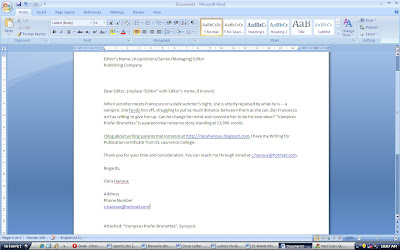If you search through the pages of any how-to book, it will tell you to keep your query (or cover letter) short. But how are you possibly supposed to dazzle an editor in a page or less? Here is my formula:
1) Start with a tantalizing synopsis, like you would find on the back of a book. That's how many authors catch my attention—if the back blurb makes the book sound like it's worth reading. You must do the same in order to catch the attention of the editor you're querying.
2) In the second paragraph, list any publishing credits—or if you've never been published, list any relevant courses you've taken (for instance, if you have your Writing for Publication certificate, or even better, you B.A. in Creative Writing). Your blog—especially if you have a large amount of followers—is something you could mention, and give a link to. So long as you don't trash editors or the publishing company you're sending to, this will provide the editor with a flavour of your writing, or an opportunity to see your existing fan base.
3) End quickly, with a short sentence thanking the editor for their time, and if applicable, how you would rather be contacted (through email, etc.). Remember to address it to the editor, if possible (sometimes no matter how hard you search, the editor just isn't listed on the site, and that's ok too). End respectfully: Sincerely, Regards, Respectfully Yours. NOT something like Peace Out, Toodles, or Ciao!
Let me backtrack to the tantalizing synopsis again. This is the most important part of the query letter, but how are you supposed to let your brilliant story shine through in only a few sentences? My method is this: I try to boil the main conflict down to only a few sentences, two or three at most. Then, if possible, I try to add a hook, a question at the end. For instance, below I will paste the blurb for a short story I recently send out to a publisher:
When Jennifer meets Francesco on a dark summer's night, she is utterly repulsed by what he is—a vampire. She fends him off, struggling to put as much distance between them as she can. But Francesco isn't as willing to give her up. Can he change her mind and convince her to be his love slave?
And now, let me show you two queries for the same story. The first is if you were going to print it out and send it by paper. The second, if you were going to send it by email. The differences are subtle, but they are there.


Does anyone else out there have some secrets to a dazzling query that they would like to share? Comment below!
Clara.
Have a great hook. The first sentence should suck the agent or editor in so they feel they must read more. So important!
ReplyDeleteJe viens de découvrir votre blog aujourd’hui et je pense que je vais passer plusieurs jours dessus.
ReplyDelete